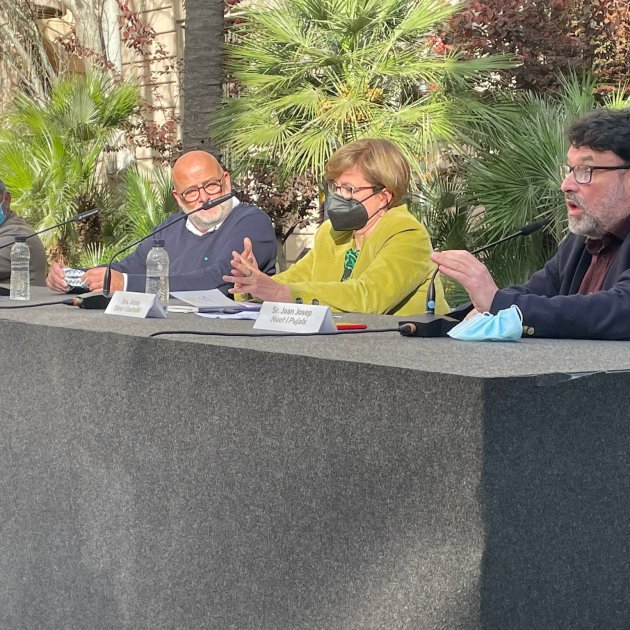At a time when politics is dominated by confrontation, the reunion of Carme Forcadell's former colleagues in the gardens of Barcelona's Palau Robert this Wednesday has been a clear exception. Lluís Corominas, Anna Simó, Joan Josep Nuet, Ramona Barrufet and Lluís Guinó were all making their "debut" as convicted criminals, having been disqualified from holding public office by the Catalan High Court - last autumn for most of them, earlier this month for Nuet in a separate trial - for their role as members of the Catalan Parliament's Bureau in the legislature which prepared the Catalan referendum of 1st October 2017. Actions for which the necessarily-absent protagonist of today's event, Carme Forcadell, is serving a prison sentence of 11 and a half years, as the head officer of the Bureau - the speaker of the Catalan Parliament.
A moment during the presentation in the gardens of the Palau Robert. / M. F.
The politicians from three different parties who served with Forcadell on the Bureau wanted to provide the presence that she could not in the launch of the book that the former speaker has written about the "bitter reality" of prison life for her fellow female inmates, Escrivim el futur amb tinta lila ("Let's write the future with purple ink"). The event also served to reflect on her role as the second-highest political authority in Catalonia, as well as revealing that, despite the turbulent legislature of 2016 and 2017, taking in the most intense years of the Catalan independence process, the relationships between the sovereignist members of the Bureau have survived, even with Forcadell behind bars. A friendship "forever," said Barrufet, having been tested by court sentences.
Despite her forced absence, the former speaker appeared in a video recorded from Wad-Ras Prison. The conclusion of her message: that "prisons are tougher for women" because they are "designed, conceived and built by men."
Forcadell: "In this book I try to explain the reality of life for women in prison... I hope it will make people think about this Republic which we want, which must put people at the centre of politics, which must give all women and men the same opportunities."
Imprisoned for "who she is"
Forcadell's own court case went far beyond that of her Bureau colleagues. She was tried and convicted by the Supreme Court, while the rest were heard at a lower court, the Catalan High Court.
"If we read the sentences, the only juridical difference between our disqualifications and the 11 and a half years she received is Carme. For the same actions, she received 11 and a half years, while we have been disqualified from office," said Lluís Corominas. Anna Simó added that "she is in prison because she was president of the ANC, it is that blunt" - a reference to Forcadell's period as head of the key pro-independence group Catalan National Assembly, before going into Parliament.
The same idea was expressed in other words by Nuet - the only Bureau member convicted who was not an independence supporter. He described the former speaker as a "scapegoat", who was imprisoned because "it is easier to convict one person than five".
Guinó added some words of hope. The former Convergència MP expressed confidence that "the pardon will arrive in a few months". He also called on the “people who can pardon” to do so.
Among those attending the presentation, leading figures in current Catalan politics such as the ministers for justice, education, health and foreign affairs - all from ERC - as well as the successors of Forcadell in the speaker's role, Laura Borràs and Roger Torrent.
Victims or criminals?
Last month, Forcadell completed three years in prison. During all this time, the former speaker of the Catalan Parliament and ex-leader of the ANC has passed through four penitentiary centers, Alcalà Meco, Puig de les Basses, Mas d'Enric and Wad-Ras, where she is currently imprisoned. In each of these centres the seed of feminism has been sown and watered.
In Escrivim el futuro amb tinta lila, the former speaker narrates the harsh experience of inmates with whom she has lived over these years, many of whom, she explains, were led to commit crimes as the only way out. Forcadell's reflection is that without an unstructured environment like the one they had been forced to live in, they would not have ended up behind bars. Therefore, she argues that if they ended up committing crimes it is because they were previously victims of inequality and of sexist violence. Moreover, she states that there are those who do not want to leave prison in order to avoid future male violence.
She also concludes, from what she has seen herself, that the Spanish - and Catalan - prison system does not serve to rehabilitate prisoners, because the punitive aspects of the sentence are given most emphasis.
Forcadell, back to a lock-up regime
On April 6th, a prisons court revoked the Level Three open prison regime which Forcadell was granted along with other convicted pro-independence politicians in January. It was the second time that this had happened. The first time, in December 2019, it was the Supreme Court that issued the ruling, which at that time went against the criteria of the respective supervisory courts. But now, with Spain's highest court having created doctrine, the decision to return the political prisoners to a conventional lock-up regime was taken by a court of first instance, without the need for the high court to be involved. A bucket of cold water on the hopes of the pro-independence prisoners.
As Forcadell comments in the video, this Friday will be the fourth Sant Jordi celebration that she and the other prisoners have spent in jail.
In the main image, convicted members of the Catalan Parliament's Bureau. / M. F.
